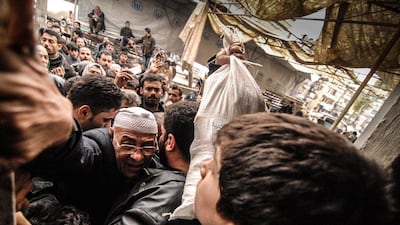DAMASCUS // Hundreds of thousands of Aleppo residents are stranded and prices for basic goods are soaring after an ISIL advance cut the sole route to regime-held areas of Syria’s second city.
The extremist group last week severed a road south of the city that formed part of the only remaining way out for residents of the government-held west of Aleppo.
With the route cut, the cost of everything from tomatoes to petrol has skyrocketed before the eyes of frustrated Aleppans.
“Within five days it has gotten to the point of madness,” Salaheddin, 45, a real estate agent from the Saif Al Dawla neighbourhood, said by telephone.
“A kilo of tomatoes today goes for between 900 and 1,000 Syrian pounds (Dh19.50) – seven times more than before,” the father-of-four added.
“There are hardly any fruits and vegetables in the city, and there are no cars in the streets because the petrol stations are closed.”
Once Syria’s economic hub, Aleppo has been ravaged by war and divided between government control in the west and rebel control in the east since fighting there began in mid-2012.
------------------------
Video: Aleppo's old city now a ghost town on the front line in Syria
------------------------
The main Aleppo-Damascus highway out of the city has been cut by rebels since then, but last year regime troops opened another route running through the towns of Safireh and Khanasser to government-controlled Hama and Homs.
Last week an ISIL advance severed the route south of Khanasser, and on Tuesday ISIL forces also pushed into the outskirts of Safireh on the road.
The advances have stranded some in Aleppo, like 30-year-old Ahmed Rami, who moved from the city to Egypt with his family three years ago. He was back visiting friends and family when the road was cut.
“The road was severed the day before I was due to travel to Beirut to continue my journey back to Cairo from the airport there,” the trader said.
“Since then I’ve been waiting impatiently for news that it has been reopened.”
He said basic goods were no longer available in the city – which before Syria’s conflict was famed for the food and spice markets of its Old City.
“There’s no gasoline so it’s hard to move around the city, and the lack of fuel oil [for generators] means the city is going to be plunged into darkness.”
Several residents accused shop owners and traders of seeking to exploit the crisis by hoarding goods and letting prices rise.
“Everyone knows that there are food reserves, but there are traders who are capitalising on the crisis to monopolise goods so that prices increase,” said Anas Shaaban, 28, a publishing house employee.
------------------------
Video: A 360-degree view inside Syria
------------------------
Even people outside Aleppo have been affected by the crisis, including Damascus resident Ihab Al Sayed, who was due to marry his fiancee from Aleppo on Wednesday.
“I’ve been forced to postpone my wedding,” he said.
“This is the fourth time I’ve delayed it, but in the past it was because of the economic crisis, and debts and costs,” Mr Al Sayed said.
“They’ve told us it will open soon, and my bride and I are waiting.”
However, not everyone is disappointed that the road is cut.
Bayan Azzam, 22, an arts student at Latakia University, came to Aleppo to visit relatives last week and is now stuck.
“I’m not sad because it’s a good chance to spend more time with my family and friends,” she said.
Others are convinced the road won’t stay out of commission for long.
“I don’t think the Russians will allow it to remain cut for much longer,” said 42-year-old Abdel Rahman Abboud, referring to Moscow’s air campaign in support of president Bashar Al Assad.
“Aleppans can adapt to any living circumstances, they have lived through all kinds of death,” he said.
“They just get bored when the internet is cut, not the road.”
* Agence France-Presse

